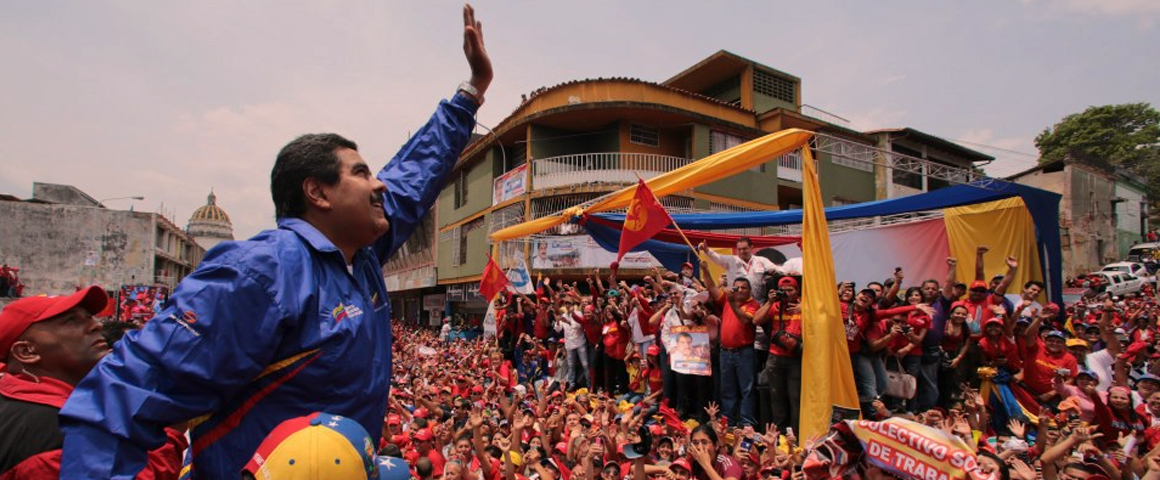It is not news that Venezuela is being ostracized in any conceivable form short of an actual military invasion, although threats to that effect have also been made by the US government. Other governments and institutions like the Organization of American States have joined in what appears to be a contest for who-is-who in ganging up against Venezuela.
What is news is that the new threat comes from the International Labour Organization (ILO) based in Geneva, Switzerland. The organization reported on March 21: “ILO Governing Body decides to appoint Commission of Inquiry for Venezuela.” [1]
Coincidentally, on March 28 the traditionally neutral government of Switzerland also joined the roll of sanctioning countries against Venezuelan institutions and senior officials. “Those on the sanctions list include former National Assembly President Diosdado Cabello, Interior Minister Nestor Reverol and Chief Justice Maikel Moreno. The Swiss sanctions include banning the sale or export to Venezuela of arms and goods.” [2]
The ILO inquiry “refers to the non-observance of ILO Conventions No. 26 (Minimum Wage-Fixing Machinery Convention, 1928), No. 87 (Freedom of Association and Protection of the Right to Organise Convention, 1948) and No. 144 (Tripartite Consultation (International Labour Standards), 1976).”
But here is what would make Karl Marx rise from his grave. The complaint “alleges lack of consultation with FEDECAMARAS on laws that affect the labour and economic interests of the employers, and the adoption of numerous increases to the minimum wage without consultation with employer and worker representatives.”
It goes further to state, “The [ILO] Governing Body has discussed this complaint six times since 2015 and had asked the Government of the Bolivarian Republic of Venezuela on several occasions to take measures to put an end to the alleged interference, aggression and stigmatization directed against FEDECAMARAS, its affiliated organizations and its leaders.”
Fedecamaras is the Venezuelan Federation of Chambers of Commerce and Production (Federación de Cámaras y Asociaciones de Comercio y Producción de Venezuela) that represents the interests of Venezuelan business and corporations. That is a legitimate role in a country where the private sector still has a strong presence, fully recognized by a government that is otherwise labeled as “socialist”, “communist”, “authoritarian”, or “dictatorial”.
However, Fedecamaras had more ambitious interests than trade and commerce for its “affiliated organizations” when former Fedecámaras president Pedro Carmona became de facto president of Venezuela for 47 hours during the failed coup against the government of president Hugo Chavez in April 2002.
Since its founding in 1919, the ILO has opened 12 Commissions of Inquiry. Of those, only three involved Latin American countries: Chile (1975) during the early days of the Pinochet regime repression; the Dominican Republic (1983) related to the employment of workers from Haiti; and Nicaragua (1987). Interestingly, the inquiry about Nicaragua refers exactly to the same issues as Venezuela today, keeping in mind that in 1987 Daniel Ortega of the Sandinista Liberation Front was president.
The specific violations investigated in Nicaragua were “murder, physical aggression, and torture” among others. But the ILO has remained silent at the slaughter of more than 2,800 labour leaders and union members since 1986 in Colombia, where danger for union leaders continues to this day. “As a result of attacks on unions and other pressures, the percentage of unionized workers in Colombia has dropped from 15 percent 20 years ago to about 4 percent today.” [3]
What is striking in the case of Venezuela is that those same corporations that claim “aggression and stigmatization directed against FEDECAMARAS, its affiliated organizations and its leaders,” are believed to be responsible for lobbying for economic sanctions, hoarding of goods, creating an induced inflationary process through parallel manipulated exchange rate, all of which is undermining the purchasing power of the Venezuelan working class. [4]
Remember that critics are wrongly calling the manufactured economic crisis in Venezuela a “humanitarian crisis.” If that were the case, why would it be considered inappropriate for the Venezuelan government intervene by increasing the minimum wage to protect the most vulnerable population? Paradoxically, the main drivers of the economic crisis maintain that they were not consulted, and claim to be the victims of a labour transgression.
The Canadian government absurdly issued a news release stating that the “Maduro regime robs its people of their fundamental democratic and human rights, and denies them assistance to meet basic humanitarian needs.” In gross contradiction, it further supports the ILO inquiry “to examine allegations that the Maduro regime failed to comply with international labour conventions on … setting of minimum wages.” [5]
This may be a rare case where a minimum wage increase is considered an offense because it affects “the labour and economic interests of the employers”. The real crime is applying sanctions against Venezuela. Alfred de Zayas, a UN independent expert for the promotion of an international democratic and equitable order, stated, “it is time” for Venezuela to ask the International Criminal Court “for an investigation into the crimes against humanity committed by the United States for imposing sanctions against it.” [6]
[1] www.ilo.org/global/about-the-ilo/newsroom/news/WCMS_622567/lang–en/index.htm
[2] https://venezuelanalysis.com/news/13744
[3] https://pulitzercenter.org/projects/south-america-colombia-labor-union-human-rights-judicial-government-corruption-paramilitary-drug-violence-education
[4] https://mronline.org/wp-content/uploads/2017/09/THE-VISIBLE-HAND-OF-THE-MARKET.-ECONOMIC-WARFARE-IN-VENEZUELA.-PASQUALINA-CURCIO-C.pdf
[5] www.canada.ca/en/employment-social-development/news/2018/03/statement-by-foreign-affairs-minister-and-minister-of-employment-workforce-development-and-labour-on-the-establishment-of-a-commission-of-inquiry-f.html
[6] https://venezuelanalysis.com/ANALYSIS/13745




